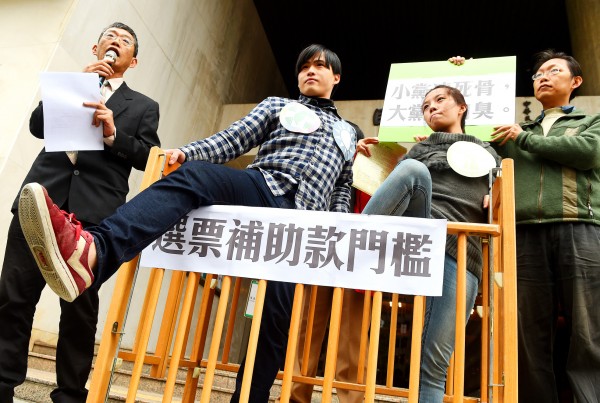《TAIPEI TIMES 焦點》 Minority parties call for lower subsidy threshold

Members of a coalition of small political parties and social activist groups demonstrate outside the Legislative Yuan in Taipei yesterday, calling for a fairer distribution of resources among all parties and a lowering of the threshold for smaller parties to receive Central Election Commission subsidies. Photo: Chien Jung-Fong, Taipei Times
UNEQUAL FOOTING: Small parties called for the vote percentage threshold for funding to be lowered from 5 to 1 percent, to give young visionaries a better chance
A coalition of small political parties and social activist groups yesterday congregated in front of the Legislative Yuan to urge that the threshold for parties to receive Central Election Commission subsidies be lowered, to ensure a fairer distribution of resources among all parties.
Citing as an example the previous legislative election in 2012, Tree Party Chairman Pan Han-chiang (潘翰疆) said the government issues a subsidy of about NT$616 million (US$19.3 million) annually for legislators-at-large, of which major political parties, such as the Chinese Nationalist Party (KMT) and Democratic Progressive Party (DPP), are given a combined total of more than NT$520 million.
Under the existing system, political parties that receive more than 5 percent of the total votes get a NT$50 subsidy per vote; the subsidies are issued every year over the four-year legislator-at-large term.
Pan urged that Article 43 of the Civil Servants Election and Recall Act (公職人員選舉罷免法), which stipulates the 5 percent threshold, be amended to lower the threshold to at least 1 percent, and that a cap be imposed on the amount of subsidies a political party can receive.
If the threshold is lowered to 1 percent, it would only increase government expenditure for the subsidies by about NT$30 million, Pan said.
“If it can be lowered to 0.5 percent, the government will only need to spend an additional NT$40 million. It is really not too much to ask, but it will greatly benefit smaller political parties’ operations,” he said.
Tree Party co-chair Lin Chia-yu (林佳諭) highlighted the disparity in funding between large political parties and their smaller counterparts, saying that the campaign funds spent by all 16 candidates nominated by her party in the November elections amounted to less than half of what a KMT or DPP Taipei councilor candidate spent.
By lowering the subsidy threshold, visionary young people would have a better chance of being elected into the legislature to push for reform, she said.
Youth Occupy Politics cofounder Shan Yi-che (冼義哲) used Germany as an example, saying that it has since 1969 lowered the threshold for subsidies to political parties to 0.5 percent of the total party votes, which granted the Piratenpartei (Pirate Party) — a young political party formed in 2006 — enough resources to land 15 seats (9.7 percent of the total floor seats) in the Berlin City Council in 2011.
Yesterday’s rallying groups later set up a crib in front of the legislature building to represent the subsidy threshold and acted out skits to satirize the current system, which they said widens the wealth gap between political parties and produces an even more disproportionate ratio of legislative floor seats.
新聞來源:TAIPEI TIMES














